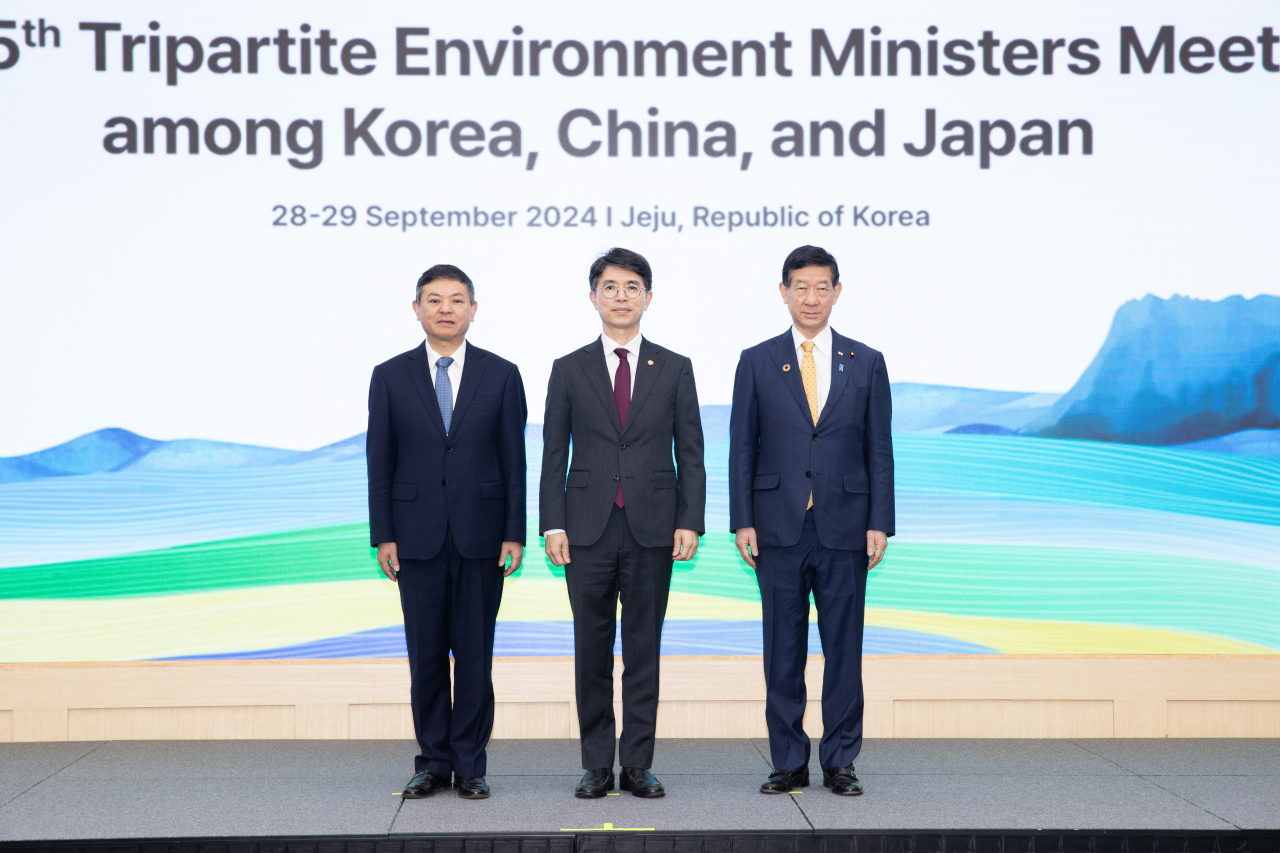 |
Korean Environment Minister Kim Wan-seop (center) poses with his Chinese counterpart Huang Runqiu (left) and Japanese counterpart Shintaro Ito during a trilateral meeting in the International Convention Center on Jeju Island, Sunday. (Environment Ministry) |
SEOGWIPO, Jeju Island – South Korea, China and Japan adopted a joint communique on Sunday promising to collaborate on addressing the environmental challenges of yellow dust and climate change.
The declaration came at the end of the annual meeting of environment ministers from the three countries held at International Convention Center on Jeju Island.
Specifically, the three countries said they will enhance "3+X cooperation" to mitigate yellow dust levels, particularly through partnerships with Mongolia.
The ministers also committed to combating plastic pollution by actively participating in the fifth Intergovernmental Negotiating Committee meeting scheduled for November in Busan, with the goal of drafting an international agreement.
During a news conference after the meeting, Korean Environment Minister Kim Wan-seop said that he discussed environmental issues in Northeast Asia with Huang Runqiu, who heads China's Ministry of Ecology and Environment, and Ito Shintaro, head of Japan's Ministry of Environment, at the 25th Trilateral Environment Ministers Meeting.
Kim stressed that the three countries, which have been close members of the same Confucian culture, account for around 25 percent of the world's gross domestic product, and are highly interdependent.
“The need and urgency for trilateral cooperation is undeniable,” he said. “In other words, without environmental cooperation among the three countries, it is difficult to solve the global environmental crisis. We can play a leading role in alleviating the crisis in Northeast Asia and the world.”
Huang said, “We will sincerely implement multilateral business cooperation on environmental issues through the trilateral environmental ministerial meeting.”
“We will actively participate in discussions on plastics environment and actively cooperate in trilateral environmental cooperation,” he added.
Ito responded by saying, “We have had a frank exchange of views at this meeting, which will play an important role in dealing with global environmental issues such as climate change and biodiversity, and we hope that the cooperation between the three countries will progress.”
At the plenary session, the ministers reviewed strategies for mutual cooperation to address regional and global environmental challenges, including yellow dust management, climate change and biodiversity preservation.
They also evaluated the implementation of the Joint Action Plan 2021-2025 outlined during the trilateral summit in Seoul earlier this year.
The three ministers reaffirmed their commitment to enhanced collaboration on climate change under the framework established at the trilateral summit and emphasized the importance of achieving net-zero emissions ahead of the upcoming 29th Conference of the Parties to the United Nations Framework Convention on Climate Change.
Additionally, the meeting focused on concerns over Japan's handling of wastewater from the Fukushima Daiichi Nuclear Power Plant, with the ministers from South Korea and China urging for transparent information disclosure.
The TEMM was held in conjunction with the Youth Forum and the Environment Industry Business Roundtable, both of which were attended by young people from the three countries.